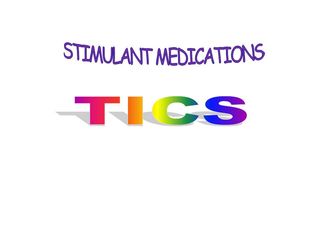Nootropics
Stimulant Treatment of Children with ADHD and Tics
Why Generalizations Are Difficult in Psychiatry
Posted October 25, 2015

Often the conclusions of psychopharmacological research articles are interpreted as dogmatic absolutes leaving little room for contrary clinical experience.
An example of a successful study that leaves ample room for clinicians to treat patients who seem to represent exceptions to the well found conclusions of the study is found in the September, 2015, issue of the Journal of the American Academy of Child and Adolescent Psychiatry, in a study of tics as a side effect of stimulant medication. This careful study clarifies an important clinical question but also illustrates difficulties with generalizations in clinical psychopharmacology.
Tics are rapid, involuntary, abnormal muscle movements such as excessive eye blinking, twisting the muscles of the lips, sniffing, or jerking an arm or leg. There are many types of tics. Tics such as eyeblinks, alone, are called simple tics. Tics that involve several different muscle groups in rapid succession are sometimes called complex tics.
For decades a dispute has persisted about whether stimulant medications for ADHD can cause tics. A recent study seems to have resolved the issue (1).
The authors of the study identified twenty two previous studies (## patients) of the stimulant treatment ADHD that were double blind and included a placebo group. These studies reported tics as side effects of the medication groups and the placebo groups. The studies were combined statistically and the data were analyzed for the frequency of tics in the two groups. The stimulant treated group developed tics or had a worsening of tics at rate of 5.7% and the placebo treated group developed tics or had a worsening of tics at a rate of 6.5%. There was no statistical difference in the rates of tic development or worsening of tics between the two groups. Also there was no relationship between the development or worsening of tics with the age of the patient, with the type of stimulant, with the dose of the stimulant, or with length of treatment with the stimulant. The study concludes that there is no evidence that stimulants cause tics in children with ADHD. The onset of tics in the children is attributed to coincidence. However unlikely, the article acknowledged the remote statistical possibility that stimulants could cause – or improve – tics, and some discussion about this was provided.
In an accompanying editorial, the dilemma of the clinician who is treating a child with stimulant medication and develops tics is explored. (2) The editorial recommends discontinuing the stimulants to learn if the tics disappear and then giving the patient the offending medication again to learn if the tics return. If the tics return when the stimulants are given again, the editorial endorses a number of additional strategies for managing this situation. The development of tics in both the stimulant treated group and placebo treated group in the research study is explained in the editorial as being caused by children with ADHD having a vulnerability to developing tics. ADHD usually begins earlier in childhood than tics and the subsequent development of tics reflects their usual later development. Because many children with ADHD are treated with stimulants, the subsequent development of tics may be incorrectly blamed on the stimulants rather than on the natural history of the development of tics. Approximately one third of children with ADHD may subsequently develop tic disorders.
For families with children with ADHD who seem to develop tics as a side effect of stimulant medication the problem is urgent. Also, it is frequently encountered in clinical practice. The need to manage the child with ADHD on stimulant medication who develops tics persists despite coincidence as an explanation in the research report.
Peter Zachar notes that clinical psychiatry tends toward nominalism; i.e., it is more invested in the specific aspects of individual human behavior and is less concerned with abstractions and generalizations (essentialism) (3). An approach that recognizes individual variation as much as generalized conclusions may reflect an appreciation that generalizations in psychiatry and most other social sciences rest on statistical methodologies or probabilities. Probabilistic statements usually allow for a more than one outcome. In this research study on tics and stimulants, the generalization that stimulants don’t cause tics had excellent research support. But the research study authors wisely left room for some patients to respond to stimulants with tics by calculating the probability that this could happen. They made their generalization but not in an absolutist or “chest thumping” (3) fashion. They allowed for the exemption of particular patients. The editorial authors expanded the consideration of particular exemptions to the generalizations of the research study by providing explanations for mechanism for patients responding to stimulants with tics and providing array of clinical interventions to consider for those patients.
The demand to consider the generalizations from research studies but to heed the specifics of the individual patient remains a part of good clinical care in psychiatry.
References
1.Cohen, Stephanie et al. Meta-Analysis: Risk of tics associated with psychostimulant use in randomized placebo-controlled trials. Jaacap 54:728, Sept 2015.
2.Friedland,S& Walkup, J. Meta-Assurance: No tic exacerbation caused by stimulants. Jaacap 54:706, Sept 2015.
3.Zachar, Peter A Metaphysics of Psychopathology, MIT Press, Cambridge Massachusetts 2014.
Copyright: Stuart L. Kaplan, M.D., 2015.
Stuart L. Kaplan, M.D., is the author of Your Child Does Not Have Bipolar Disorder: How Bad Science and Good Public Relations Created the Diagnosis. Available at Amazon.com.



